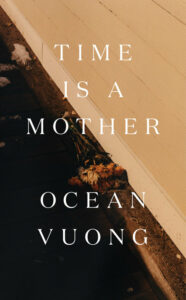
Ocean Vuong on Taking the Time You Need to Write
"Live your life but tend to the work mentally."
As told to Lit Hub senior editor Corinne Segal. This interview has been edited and condensed. The following first appeared in Lit Hub’s The Craft of Writing newsletter—sign up here.
*
The Japanese have this idea of the color of a poem. Bashō talks often about the colors of poems. I think what he means by that is the moods and the tones, the sort of aesthetic principles of them. And I think that you can’t just sit down and write that, you have to really embody it. That’s the hardest part: figuring out what tone or what mood you’re writing towards. A lot of this has to do with the themes you’re working with, or the mode that you want to present. That takes sometimes weeks, months — years, really — to develop before language comes to fruition. Language has its own register, like music, and depending on the “octave” or the tone that you’re using, there are connotations, there are meanings, implicit in tone.
It’s important for me to figure out and embody these moods or these colors before I sit down to write. This happens with poems and it also happens with chapters. In On Earth We’re Briefly Gorgeous, there are so many varying speeds. There are some chapters that exist in the present tense, and it’s very fast-paced. And then there are some chapters that are very slow and the tone is very different. You can’t just sit down and wing it. Those ideas have to be developed through time, and the best way is to just live your life but tend to the work mentally. Tend to it while you’re doing your dishes, while you’re showering, taking a dog for a walk.
I think of John Berryman. I read an anecdote of Berryman, of what he did when he was drafting. He’d make corrections, and then he’d update the new draft on a typewriter, and then he’d flip it into a plastic glassine — you know, just a film or a sleeve — and then he’d read it for the next two or three days without correction. What happens is that there are so many edits that come, that he just doesn’t do. The idea is to not do it. And then, by the third day, the edits that survive the mind hovering over them are the ones that — you slip [the draft] out of the glassine and make them right away.
It shows that there is so much work that could be done when we meditate on a poem, rather than constantly putting pen to paper, marking things up because it seems very productive. In fact, so much of creation is thinking. For me, stepping away from a poem or reading a poem without manipulating it as part of the drafting process is really powerful. You realize that something you recognize on Day One becomes very forgettable on Day Three. But then something else — this bigger thing underneath — comes through, and you say, Oh my goodness, if I were to write another draft right away, I would have missed all that.
It’s never done. If I had a chance now with every book I wrote, every page would be a little different. Commas would be moved, words. And I think that’s beautiful, actually. That’s a good thing. It reminds us that the artist and the mind and the poem still grow. The poem is like a tree, and the book is a photograph of the tree. You take a photograph of the tree, but the next day, the tree has new cells. The next year, it has new branches. We have to make peace with the fact that a book is actually just a photo album, and that the organic psychic life of the poem is already growing somewhere else, somewhere inside you. And we pin it down. Maybe that’s why Whitman wrote so many editions of Leaves of Grass. He was like, I’ve got to update it. If it’s up to me, I’d update it too. But the conditions of publication in the 21st century don’t make that possible; there are limitations of the material world.
So I just make peace with it. I say, Well, maybe I have to take another photo of this tree in another book. The best way to revise, after a while, is to make something new.
__________________________________

Time is a Mother by Ocean Vuong is available via Penguin Press.



















